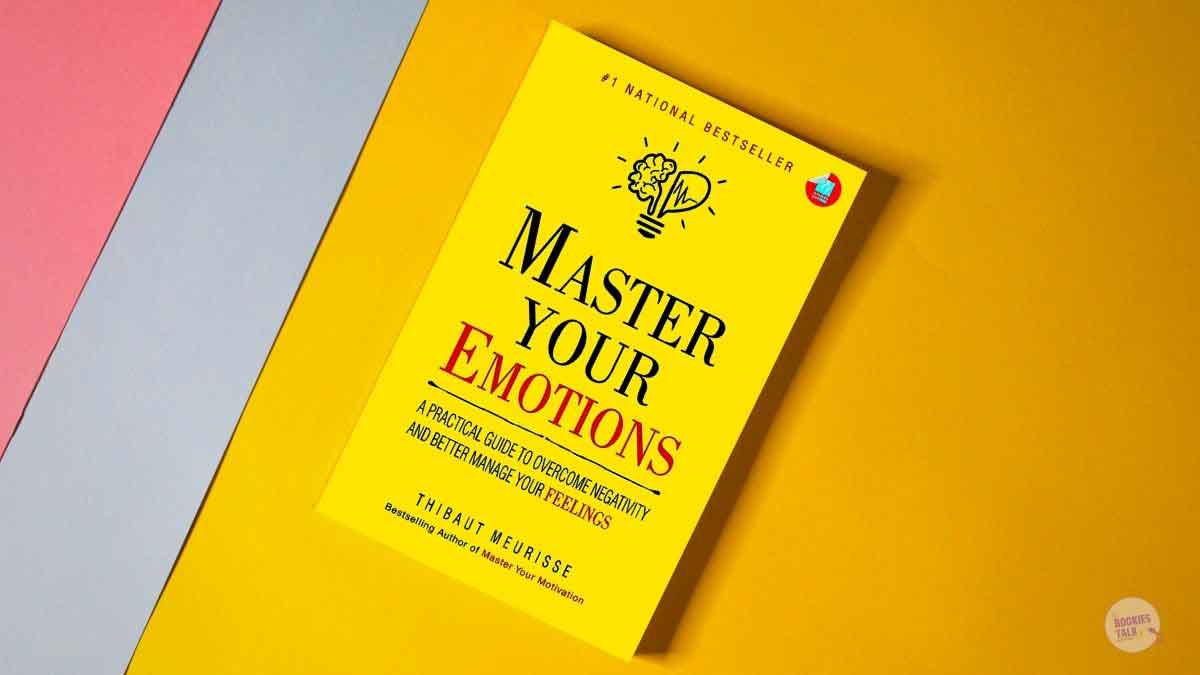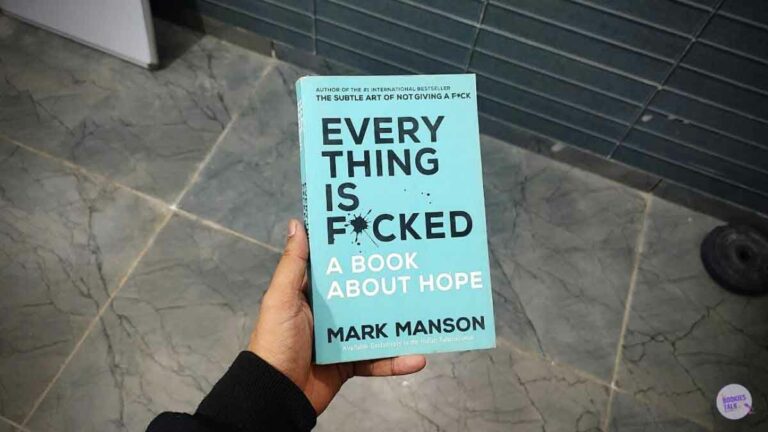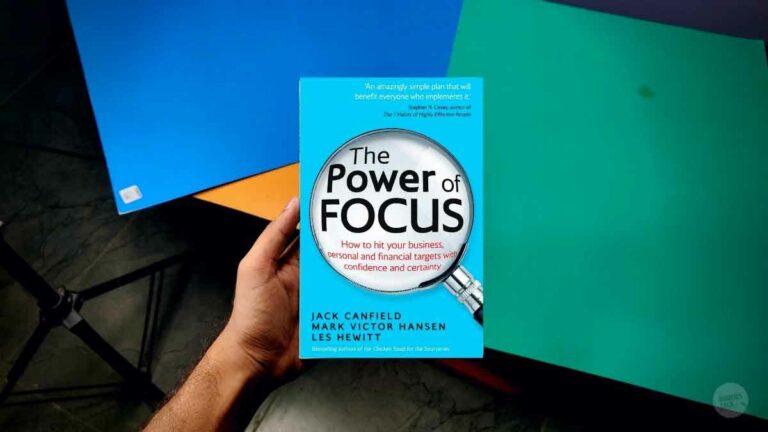Master Your Emotions Summary (Plus PDF)

We usually have six common emotions which everyone already knows for example; Happiness, Sadness, Fear, Disgust, Anger, and Surprise. Out of these six Emotions, you can relate to Fear as we all are afraid of something whether it’s losing parents, losing a job, or missing out on opportunities
The formula has been used by Thibaut Meurisse author of Master Your Emotions, who talks about how everyone should take control of their Emotions.
We all know that humans have negative and positive thoughts, Now, as the author says, you can’t control your thoughts but you can control what to see and what not to.
If you struggle to deal with negative emotions or want to learn how emotions work and how you can use them as a tool for your personal growth then this book is for you.
So let’s explore the book together…
Let me first say thank you for reading this. This will be a weekly newsletter, hope you enjoy it. Now I will see you every Sunday at 9:00 AM (IST).
Master Your Emotions Summary
I don’t know about you but I have made lots of decisions because of Fear and Love, I wish I could have read this book earlier but hey, each decision has taught me a lot, It’s like, it’s okay to make mistakes but repeating the same again and again is not.
Each failure will teach you something, you just have to learn from it and keep moving, This is the only way to grow otherwise, you will be stuck in one zone and it will be hard to get out.
By the way, the book is divided into 4 parts;
- PART 1: You’ll learn why you are wired to focus on negativity and what you can do to counter this effect. You’ll also discover how your beliefs impinge upon your emotions. Finally, you’ll learn how negative emotions work and why they are so tricky.
- PART 2: You’ll understand the roles your body, your thoughts, your words, or your sleep, play in your life and how you can use them to change your emotions.
- PART 3: You’ll also learn how to condition your mind to experience more positive emotions.
- PART 4: You’ll learn why you experience emotions such as fear or depression and how they work. You’ll then discover how to use them to grow.
I’m keeping my promise, this is the mini-ebook of Master Your Emotions by Thibaut Meurisse. So download right now and read wherever you want for free. Happy Reading.
Fears You May Experience
There is a law in nature: things either grow or die. The same goes for human beings. When humans don’t move beyond their comfort zone, they start dying inside. Don’t let that happen to you.
As Benjamin Franklin said, “Some people die at twenty-five and aren’t buried until seventy-five.”
Fear of rejection: You’re afraid of being rejected. This may be physical rejection from a specific group, but it is generally more subtle. For instance, you may be afraid of:
- Making a comment people could disapprove
- Asking someone out and being turned down,
- or Sharing your work and being criticized for it.
Now, let’s talk about the Fears;
Fear of failure: You’re afraid of failing. This usually comes from the deepest fear of not being good enough. you are afraid of being ridiculed and believe that failure will erode your self-esteem.
If you don’t try something then how will you learn new things? Failure is not a setback, it’s an opportunity to learn something new. So don’t be afraid of fear
Fear of loss: Human beings have an aversion to loss, which is why we are often more motivated to prevent a loss than to secure a gain.
Fear of disturbing: You’re afraid of disturbing people. Perhaps due to the belief, that you’re not important enough. As a result, you may feel reluctant to affirm yourself for fear of appearing selfish.
I mean, just go out, ask questions, meet with people, and just start a conversation. No one will kill you, what worse can happen?
Sit down and imagine that in your mind.
Fear of success: You’re afraid of success. You may worry you won’t be able to sustain it with all the added pressure on your shoulders.
Your Brain’s Job
We have already covered in Atomic Habits how your brain will always find a way to survive, no matter what happens, your brain will find a way to solve whatever problems you have.
It doesn’t care whether the solution will harm your body or not.
For example, if you love to drink alcohol and at the same time, if you’re feeling sad then your brain will remind you to drink alcohol because alcohol gives you the Dopamine you need.
One of the roles of dopamine is to ensure you look for food so you don’t die of starvation, and you search for a mate so you can reproduce.
Without dopamine, our species would likely be extinct by now. It’s a pretty good thing, right?
Well, yes and no. In today’s world, this reward system is, in many cases, obsolete. While in the past, dopamine was linked to our survival instinct, The release of dopamine can now be generated artificially (e.g. cup of coffee).
Related: 15 Must-Read Books in Life
A great example of this effect is social media, which uses psychology to suck as much time as possible out of your life. Have you noticed all these notifications that pop up constantly?
They’re used to trigger a release of dopamine so you stay connected, and the longer you stay connected, the more money the services make.
Watching pornography or gambling also leads to a release of dopamine which can make these activities highly addictive.
Fortunately, we don’t need to act each time our brain releases dopamine. For instance, we don’t need to constantly check our Instagram feeds just because it gives us a pleasurable shot of dopamine.
All in all, your brain doesn’t know RIGHT or WRONG, and this is where you have to take control of it.
Look, there is no need to watch every single new movie, TV show, or even YouTube video. Even more, there is no need to use social media, just think for movement, why you’re using Instagram or even X (Twitter).
Control Over EGO
Your understanding of the way your ego works depends on your level of self-awareness. People at the lowest level of consciousness are not even aware the ego exists and, as a result, are enslaved by it.
On the other hand, highly self-conscious people can see through their egos.
They understand how belief works and how excessive attachment to a set of beliefs can create suffering in their life. In effect, these individuals become the master of their minds and are at peace with themselves.
Note that the ego is neither good nor bad, it’s just a result of a lack of self-awareness. It fades away as you become aware of it since ego and awareness cannot coexist.
It’s just like when you get angry at someone and you realize that “my voice is going up and I’m about to hit someone” This is that time when you’re aware of your anger.
There are higher chance that you will able to control your anger.
List of things your ego generally derives its identity from:
- Your body
- Your name
- Your gender
- Your nationality
- Your culture
- Your family/friends
- Your beliefs (political beliefs, religious, etc.)
- Your personal story (your interpretation of the past, your expectations regarding the future)
- Your problems (illnesses, financial situation, victim mindset, etc.)
- Your age
- Your job
- Your social status
- Your role (as employee, homemaker, parental status, employment status, etc.)
- Material items (your house, car, clothes, phone, etc.)
- Your desires
Understanding the way your ego works can help you better control your emotions.
To do this, you must first realize your current story is the result of strong identification with people, things, or ideas.
This strong identification is the root of many of the negative emotions you experience in your life.
For instance:
- When life doesn’t unfold according to your personal story you get upset, or
- When someone challenges one of your beliefs you become defensive.
Your beliefs are yours and it’s okay if someone doesn’t agree with you. Just let it go, you don’t have to start an argument.
Negative Emotions Are Not Bad or Useless
You may blame yourself for experiencing negative emotions or, perhaps, you see yourself as mentally weak. You may even believe something is wrong with you.
However, despite what your inner voice may say, your emotions aren’t bad. Emotions are simply emotions. Nothing more.
As such, being depressed doesn’t make you less of a person than you were three weeks ago when you were happy. Feeling sad now doesn’t mean you’ll never be able to laugh again.
Remember this: the way you interpret emotions, as well as the blame game you engage in, creates suffering, not the emotions themselves.
Think of your negative emotions as the emotional equivalent of physical pain. While you hate being in pain, if you didn’t have pain, chances are you would be dead by now.
Physical pain sends a powerful signal that something is wrong, nudging you to take action of some kind. It could be to consult your doctor, which may lead you to undergo surgery, change your diet, or increase exercise.
Without physical pain, you wouldn’t do any of these things and your situation would worsen, potentially leading to premature death.
Emotions work the same way.
They signal you to do something about your current situation. Perhaps, you need to let go of some people, quit your job, or remove a disempowering story that creates suffering in your life.
Questions to Ask Yourself:
Start noticing how you feel. Record your negative emotions. Look at what triggers them. The more you do this, the more you will uncover certain patterns.
For example, let’s say you felt sad for a couple of days, ask yourself the following questions:
- What triggered my emotions?
- What fueled them over the two-day period?
- What story was I telling myself?
- How and why did I get out of my slump?
- What can I learn from this episode?
Answering these questions will be invaluable and will greatly help you deal with similar issues in the future.
Why problems don’t exist
If we go one step further and look at reality in an objective way, we can say that problems don’t actually exist.
Here is why:
What you don’t focus on doesn’t exist: A problem only exists when you give it your attention. From your mind’s perspective, what you don’t give any thought to doesn’t exist.
Let’s take a hypothetical example.
Imagine you lost your legs. If you accept that fact immediately and refuse to give it any thought, there will be no problem and thus, no mental suffering.
You would simply be living in reality, (of course, that’s usually not what happens).
A problem exists only in time: A problem can only exist in the past or in the future. And where do the past and future exist? In your mind.
To acknowledge a problem, you must use your thoughts, and thoughts exist in time, not in the present moment.
A problem needs to be labeled as a problem to actually exist: A problem exists only when you interpret a situation as being a problem. Otherwise, there is no problem.
Reconnect with Your Body and Your Emotions
Exercise: As I previously said, exercising is a great way to calm your mind and connect with your body, and it has a positive effect on your mood.
Meditate: Meditation is an effective way to observe your mind and stop identifying with your thoughts so heavily. Meditation is simply a tool to help you reconnect with reality by observing thoughts, emotions, and sensations instead of getting lost in your mind.
Activity: Getting busy allows you to avoid excessive thinking. Instead of feeding your depression with constant negative thoughts, concentrate your attention on something else.
Focus on others: As mentioned in Dale Carnegie’s book, How to Stop Worrying and Start Living, Alfred Adler used to say to his melancholia patients, “You can be cured in fourteen days if you follow this prescription. Try to think every day how you can please someone.”
Whether or not it is accurate, focusing on others can certainly help you forget about your own issues and focus on something more positive.
Master Your Emotions Lessons
- You don’t have control over the past or even the future, so it’s better that you focus on the present and improve yourself for a better future.
- Fear doesn’t do any good, so be aware of your action and see things as it is.
- Never get unhappy because of someone else’s thoughts.
- Dopamine does make you happy but learn to control it otherwise, the day will come when the Dopamine will start controlling your life.
- Take care of your body and mind, so it can work for you otherwise the day will come when you realize the importance of exercise and eating healthy food.
Master Your Emotions Quotes
“With practice, you learn to distance yourself from thoughts, reducing their power and their impact.”
“What it means is that, in the long run, external events have minimal impact on your level of happiness.”
“What people think of you is none of your business”
“Do you believe that one day you will achieve your dream and finally be happy?”
“A problem exists only in time: A problem can only exist in the past or in the future. And where do the past and future exist? In your mind. To acknowledge a problem, you must use your thoughts, and thoughts exist in time, not in the present moment.”
“People often do this. They waste time holding onto negative emotions that serve no purpose just because they can’t let go of them.”
“How on earth can another’s thought about you harm you? It is your thought about his thought that harms. Change your thoughts. ”
Master Your Emotions Review
To be frank, I didn’t learn anything new from this book because earlier, I had read tons of self-help books, and almost all the self-help books talked about emotions and how one should overcome fear and take control of life.
Thibaut Meurisse has also talked about the same things but in a different way.
So if you haven’t read many books then you can read this book, you won’t regret it.
A few words from my side:
Life is beautiful, so don’t make it too complicated. The things you imagine, the things you see, and the things you listen to will be your future. Also, keep in mind, that you have a choice.
BUY Master Your Emotions:
Love What You Read, You Might Like These too…






